Fuel takes up a lot of the operating costs spent on farming operations. Varying diesel fuel prices across the market and unreliable diesel storage solutions on top of extreme weather conditions all seem like the perfect recipe for stress!
Granted, the weather is much harder to control, but there are a bunch of things that you can do to save fuel on your farm.
Below is a list of fuel-saving best practices and quick wins that you can start immediately:
1. Reduce the number of field operations
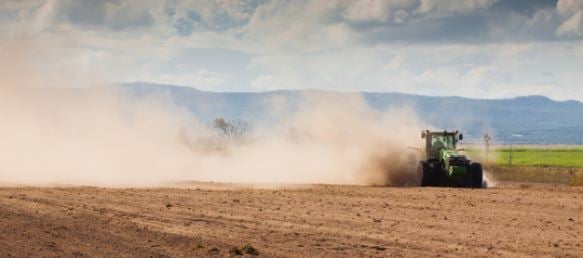
- Consider no-till farming
Besides its many advantages to soil health, no-till farming greatly reduces the number of times you spend on field operations, thereby saving fuel and fuel costs. Even minimum tillage can save you about 10 percent of fuel on your farm.
- Hit two birds with one stone by combining field operations
When you combine at least two field operations into one, you not only save on fuel but also reduce wheel traffic and soil compaction.
Example:
- Using liquid fertiliser reduces the number of passes and the time you spend on the field spraying. This is because you can blend the liquid fertiliser with crop protection products.
- Combine moving stock with other types of field work if possible.
Taking the time to find out which tasks can be combined, or even which ones can be eliminated – particularly those that include machinery like tractors and other vehicles – can save you on diesel costs.
2. Don't underestimate the value in routine maintenance
Poorly-maintained vehicles/machinery won’t serve you. Ensure that your tractors and other machines you use on your farm are all in good condition.
Here’s a simple checklist to guide you:
- Change oil (correct grade), fuel and air filters according to manufacturer’s recommendations.
- Fuel related components (i.e. carburettor settings and fuel bowls) must be checked to ensure that they are functioning properly.
- Check fuel injectors. Ensure that they’re clean and clog-free.
- Check for any signs of smoke or leaks regularly.
- Regularly check equipment such as knives on harvesters and mowers and ensure that they are sharp.
- Note that fuel consumption increases with equipment that’s not adjusted to reduce friction.
- Tractors and all other equipment should be lubricated regularly.
3. Use the right machinery for the job
The right machinery for the job helps you avoid using an unnecessary amount of fuel.
- Match tractor size and horsepower to your farm implement size.
- For lighter jobs or lighter loads, use the smallest tractor appropriate for the job.
- Avoid overloading small tractors.
- The heavier weight of a larger tractor would eat up too much fuel if its horsepower is not needed for the job. Hence, use larger and more powerful tractors only for operations that demand greater horsepower.
4. Minimise unnecessary trips and idle times
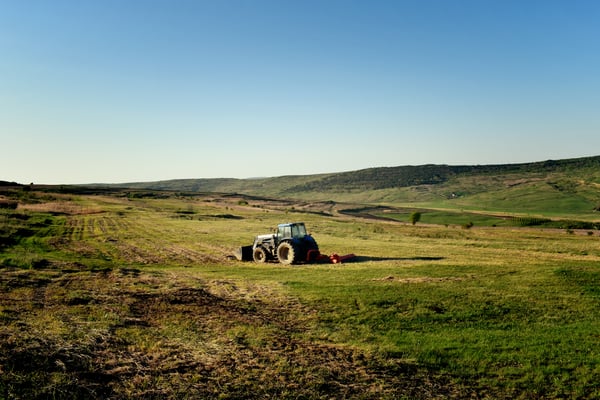
Trips that aren’t necessary must be avoided. Bring all you need for the day to avoid going back. Additionally, vehicles must be switched off when not in use.
5. Optimise tractor performance
- Ensure accurate tractor ballast
The right amount of ballast is important especially when you must deal with unstable ground or use your loader a lot. Ballasting your tractor enables it to have a proper traction or grip on the ground it’s making contact with. Too much or too little would consume an unnecessary amount of fuel.
- Inflate tyres
Tyres that are not inflated correctly would damage them before their time, make the ride uncomfortable for you and compromise traction efficiency. Studies show that even just one under-inflated tyre can unnecessarily increase fuel consumption by up to 3 percent.
- Observe wheel slip for too much or too little weight/pressure.
Wheel slip is closely related to fuel-efficiency. In order to determine if slippage is costing you too much fuel, start by observing your tyre's print on the soil. The correct tyre print has a combination of both slippage and tread pattern.
With excessive slippage, you will lose an excessive amount of fuel due to wasted rotations. As a result, your tyres will deteriorate quickly!
On the other hand, a wheel slip that is too low could have something to do with a strained drive train, which means that there is an unnecessary amount of weight present. As mentioned earlier, extra weight will consume too much fuel.
Additionally, ensure that your wheels are in good working order.
6. Teach staff about the importance of reducing diesel consumption
When it comes to fuel-efficiency, everyone on your farm or property should be on board. Teach your staff to be mindful of the ways that diesel fuel can be wasted.
Related Article:
Tips on How to Document Diesel Fuel Consumption On Your Farm
7. Develop a fuel management plan
You can use the items listed here to be part of your fuel management plan. Keep a record of the changes you’re planning on making and see the before and after results.
8. Monitor fuel storage
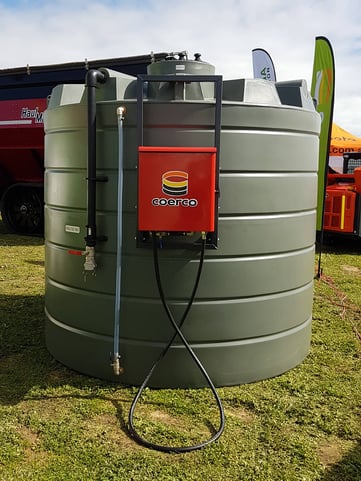
Coerco poly diesel storage tank
To avoid fuel storage problems, store your fuel correctly. Check your fuel storage for any leaks or cracks or anything that might compromise or waste your fuel.
9. Use reliable diesel storage tanks and diesel transport units
Quality diesel storage tanks and diesel transport units ensures that your diesel fuel is stored and transported safely. It minimises leaks or accidents that would result in downtimes. As a result, you'll experience a smoother workflow around your farm, experience zero interruptions so that you can get your products quickly to market.
Which tips do you think you’ll do first today?
Whichever one you do first, remember to complement your farm vehicles, machinery, and your overall energy efficiency plan with the right diesel storage and diesel transport solutions.
Related topic:
Diesel Storage: 7 Helpful Reminders and Tips for Purchasing Diesel



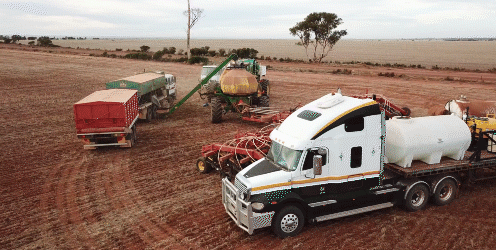

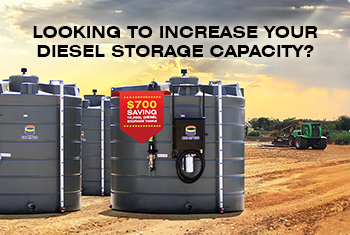
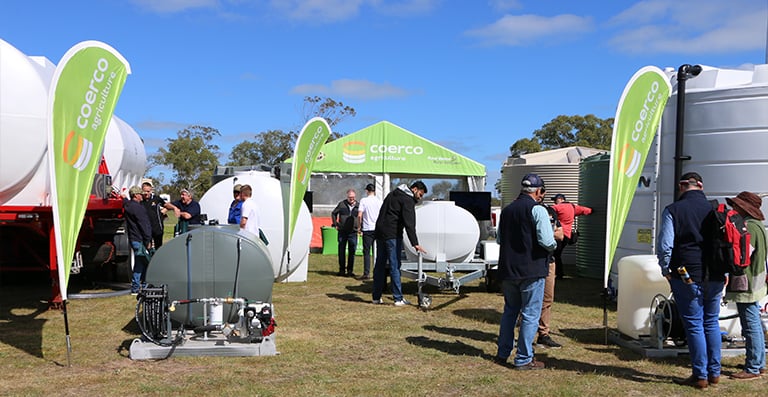
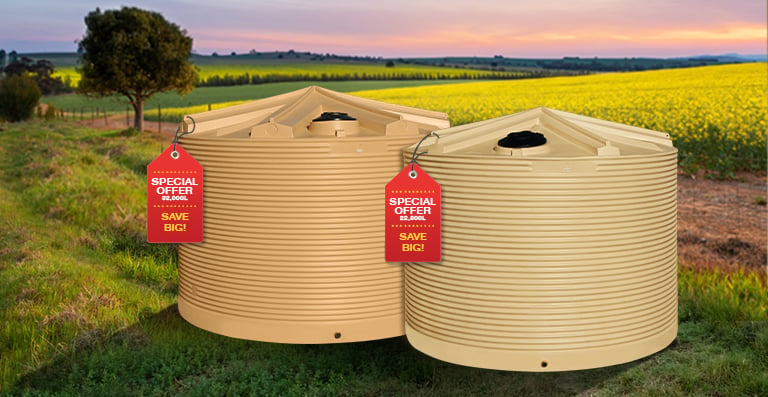
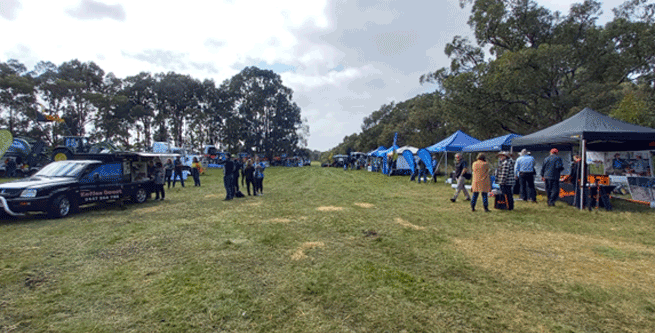
What do you think about this post?
Comments